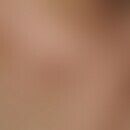DefinitionThis section has been translated automatically.
PAC is the acronym for an autoinflammatory syndrome characterized by "pyoderma gangraenosum, acne and ulcerative colitis". This constellation is a rare coincident inflammatory disorder characterized by a chronic recurrent course of pyoderma gangrenosum, acne vulgaris, and ulcerative colitis
ClassificationThis section has been translated automatically.
Autoinflammatory syndromes associated with hidradenitis suppurativa (HS) and/or acne are rare inflammatory disorders with a common pathogenesis involving a dysregulated innate immune system with abnormal interleukin (IL)-1 signaling leading to sterile neutrophilic inflammation in different organs. To date, several clinically distinct syndromes of this group of forms have been described in the literature, including:
- PAPA: pyoderma gangraenosum, acne and pyogenic arthritis.
- PASH: pyoderma gangrenosum, acne and hidradenitis suppurativa
- PASS: Pyoderma gangrenosum, acne, and spondyloarthritis
- PA-PASH: pyoderma gangrenosum, acne, pyogenic arthritis, and hidradenitis suppurativa
- PsA-PASH: psoriatic arthritis, pyoderma gangrenosum, acne, and hidradenitis suppurativa
- PAC: pyoderma gangrenosum, acne and ulcerative colitis.
It is important to raise awareness of these diseases in order to optimize disease management and ultimately improve patients' quality of life.
You might also be interested in
EtiopathogenesisThis section has been translated automatically.
Over the past decade, new scientific discoveries have greatly improved our understanding of the molecular pathogenesis of autoinflammation and have led to the identification and definition of several Pyoderma gangrenosum-associated autoinflammatory syndromes (PGAAIS) as new and distinct clinical entities. The individual syndromes are distinguished by their clinical presentation and the presence or absence of mutations in multiple genes. These include: PSTPIP1 gene, NCSTN gene, Mediterranean fevergene (MEFV gene), and nucleotide-binding oligomerization domain-containing protein(NOD) gene.
LaboratoryThis section has been translated automatically.
Elevated systemic inflammatory markers in the blood
TherapyThis section has been translated automatically.
The rarity of each syndrome makes it difficult to establish evidence-based treatment guidelines. Anti-TNF-α and anti-IL-1a blockade are among the therapeutic approaches for the different syndromes.
Note(s)This section has been translated automatically.
Pyoderma gangrenosum-associated autoinflammatory syndromes (PGAAIS) belong to the spectrum of neutrophilic dermatoses.They share similar mechanisms from a pathophysiologic perspective, including neutrophil-rich cutaneous inflammation and overexpression of the interleukin-1 (IL-1) family.
LiteratureThis section has been translated automatically.
- Antón-Vázquez V et al (2020) Adult-Onset Autoinflammatory Syndromes. J Clin Rheumatol 26: 160-163.
- Garcovich S et al (2021) PASH, PAPASH, PsAPASH, and PASS: The autoinflammatory syndromes of hidradenitis suppurativa. Clin Dermatol 39:240-247.
- Huang J et al (2022) Pyoderma gangrenosum, acne, and hidradenitis suppurativa syndrome: A case report and literature review. Front Med (Lausanne) 9:856786.
- Leuenberger M et al (2016) PASS Syndrome: An IL-1-Driven Autoinflammatory Disease. Dermatology 232:254-258.
- Nikolakis G et al (2021) Case Report: PsAPSASH syndrome: an alternative phenotype of syndromic hidradenitis suppurativa treated with the IL-17A inhibitor secukinumab. F1000 Res 10:381.
- Saternus R et al (2020) Ancient friends, revisited: Systematic review and case report of pyoderma gangrenosum-associated autoinflammatory syndromes. J Transl Autoimmune 3:100071.
- Vinkel C et al (2017) Autoinflammatory syndromes associated with hidradenitis suppurativa and/or acne. Int J Dermatol 56:811-818.
Incoming links (1)
PsA-PASH;Outgoing links (9)
MEFV Gene; NCSTN Gene; Nod; PA-PASH syndrome; Papa syndrome; Pash syndrome; PASS syndrome; PsA-PASH; PSTPIP1 Gene;Disclaimer
Please ask your physician for a reliable diagnosis. This website is only meant as a reference.




